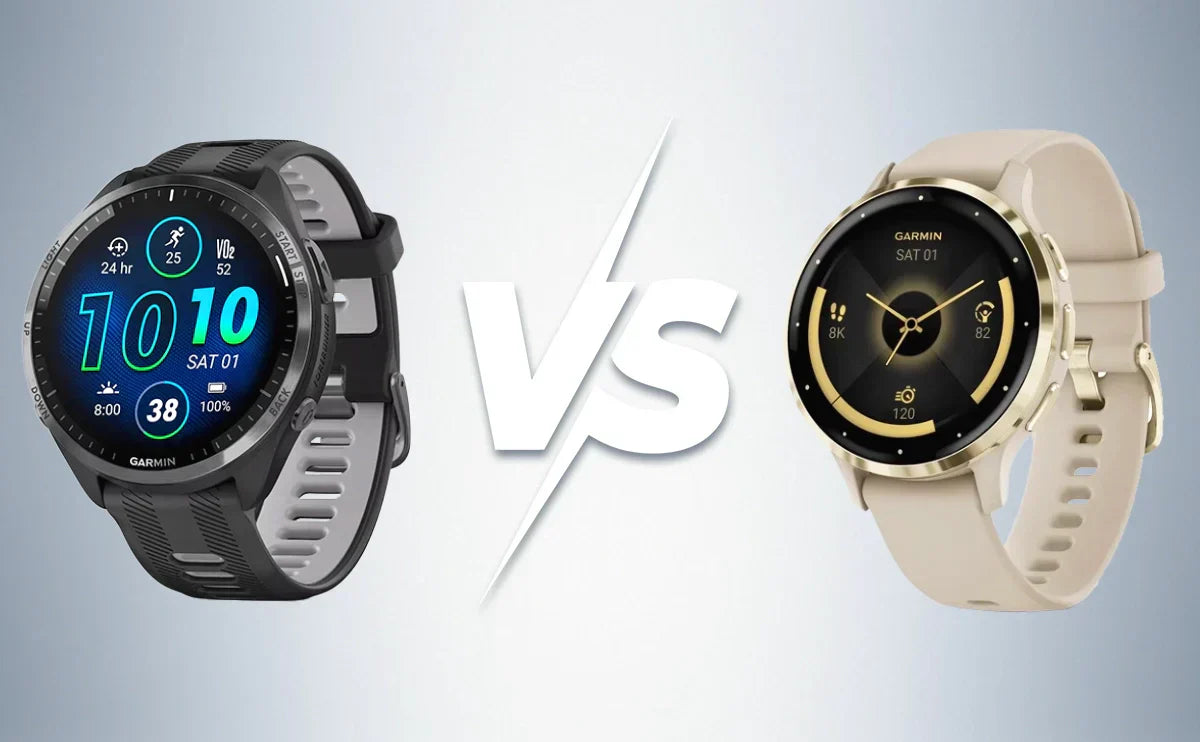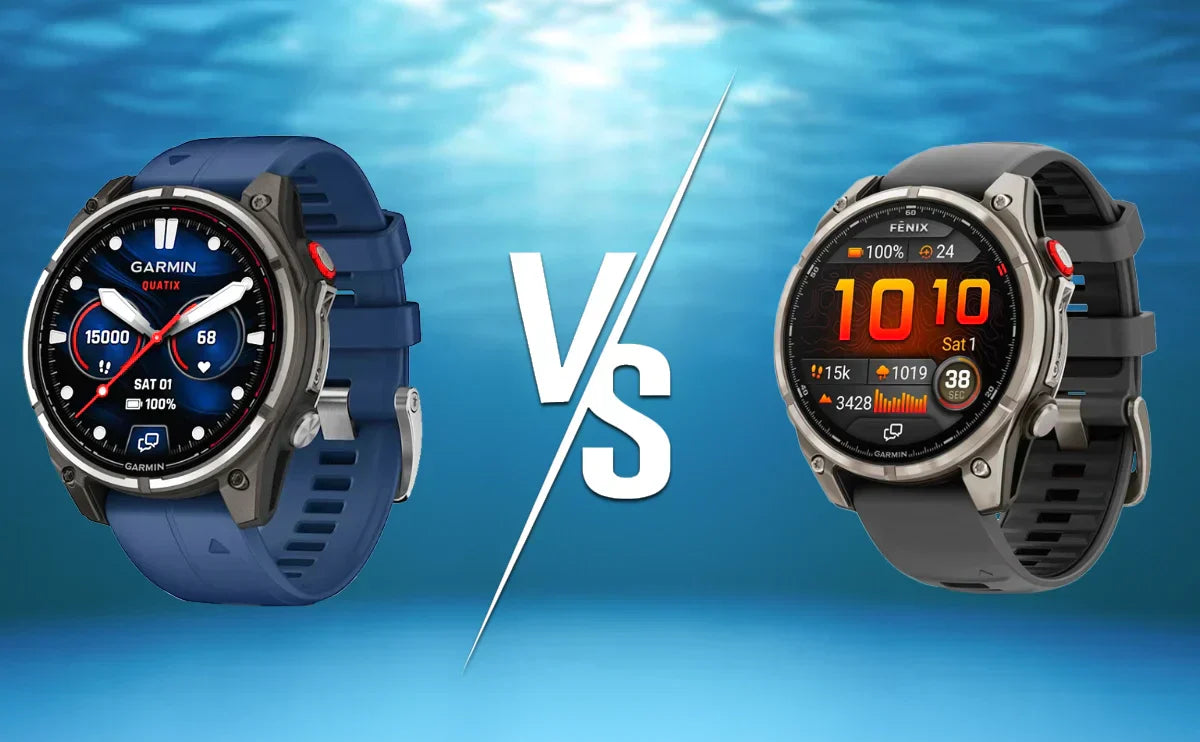Main content:
- Bandletic’s Verdict
- Fitbit Sense 2 vs Versa 4 - Is the Extra $70 Worth It?
- Fitbit Sense 2 vs Versa 4 - Which Offers Better Design and Wearing Comfort?
- Fitbit Sense 2 vs Versa 4 - Which One Wins in Health Tracking? Real-World Experience Tells the Truth
- Fitbit Sense 2 vs Versa 4 Fitness Tracking - Equally Precise Performance
- Fitbit Sense 2 vs Versa 4 - Comparable Smart Features, But Which One Feels More Practical?
- Choosing the Right Fitbit Smartwatch for You
The Fitbit Sense 2 and Versa 4 are two popular smartwatches launched after Google acquired Fitbit. Although they don’t run on Wear OS, they introduce Google Maps and Wallet support for the first time, enhancing the smart experience. Both models share a similar design and overlapping features, including built-in GPS and over 40 exercise modes, but each has its own focus: Versa 4 targets fitness enthusiasts with advanced workout tracking, while Sense 2 emphasizes health management with a continuous EDA sensor for all-day stress monitoring.
If you’re torn between the “Fitbit Sense 2 vs Fitbit Versa 4,” this comparison will help you quickly understand their key differences and choose the perfect fit for you.
You can also check other top articles about Fitbit Sense 2 bands below:
Top 15 Best Fitbit Sense 2 Bands in 2025
Top 10 Best Fitbit Sense 2 Bands 2025 in the US
Top 10 Best Fitbit Sense 2 Bands For Women in 2025
Top 10 Best Fitbit Sense 2 Bands Brands in 2025
Bandletic’s Verdict
The Fitbit Sense 2 and Versa 4 each have their strengths. The Sense 2 focuses on advanced health monitoring and premium design, ideal for users who want deeper health insights. The Versa 4 offers a slimmer build and more affordable price, perfect for those seeking basic features and great value. Both share similar smart features and appearance, so your choice mainly depends on your health tracking needs and budget.
Fitbit Sense 2 Pros
- Supports ECG to detect irregular heart rhythms like AFib
- Features EDA sensor for continuous stress tracking
- Built-in skin temperature sensor
- Large, bright AMOLED display with long battery life
Fitbit Sense 2 Cons
- Higher price point
- No support for third-party app installation
Fitbit Versa 4 Pros
- Affordable with excellent value
- Slim and comfortable design
- Supports Alexa, Google Wallet, call answering, and other smart features
- Comprehensive basic health and fitness tracking
Fitbit Versa 4 Cons
- Lacks ECG and EDA sensors
- Also does not support third-party app installation
Fitbit Sense 2 vs Versa 4 - Is the Extra $70 Worth It?
As a long-time user, I’ve tested both the Fitbit Sense 2 and Versa 4. The Sense 2 is priced around $250–$300 and focuses on advanced health monitoring, featuring ECG, continuous stress tracking, and SpO₂ measurement- ideal for those who prioritize detailed health data. The Versa 4 is more affordable, about $150–$230, emphasizing fitness tracking with built-in GPS and over 40 exercise modes, perfect for everyday workout enthusiasts.
Both come with six months of Fitbit Premium, enhancing the overall experience. In short, the extra $70 buys you more comprehensive health features- Sense 2 is better for health-focused users, while Versa 4 offers better value for those focused on fitness and budget.
Winner: Draw.
The best choice depends on whether you prioritize health management or fitness tracking.
Fitbit Sense 2 vs Versa 4 - Which Offers Better Design and Wearing Comfort?
As a long-term user, I've had the chance to thoroughly experience the differences between the Fitbit Sense 2 and Versa 4 in terms of size, weight, design, and wearing comfort. Both smartwatches feature a 40mm case size, and their weights are quite similar: the Sense 2 weighs approximately 35–38 grams (about 1.23–1.34 ounces), while the Versa 4 is slightly lighter at around 33–37 grams (about 1.16–1.31 ounces). Both feel lightweight on the wrist and cause no noticeable discomfort even during extended wear.
In terms of design, both models feature a square watch face with an aluminum frame, but they differ slightly in style. The Sense 2 has a more high-tech and angular look, with curves that better contour to the wrist, while the Versa 4 features a rounder, softer design that gives it a sleek and minimalist appeal- ideal for everyday wear. Both are water-resistant up to 50 meters and bring back the physical button for easier and more intuitive operation.
When it comes to colors and band materials, the Sense 2 leans toward a more premium and comfortable aesthetic, offering options like Fog Gray and Lunar White, making it suitable for both business and fitness scenarios. The Versa 4, on the other hand, emphasizes practicality, with more durable straps and vibrant color options to meet diverse daily needs.
Winner: Draw.
Both smartwatches excel in design and comfort, with differences that mostly come down to personal preference and individual style. Whichever you choose, you’ll enjoy a comfortable and stylish wearable experience.

Fitbit Sense 2 vs Versa 4 - Which One Wins in Health Tracking? Real-World Experience Tells the Truth
As someone who has worn both the Fitbit Sense 2 and Versa 4 for an extended period, I’ve gained firsthand insight into their differences when it comes to health tracking. Both smartwatches handle daily fitness tracking well- they support GPS, heart rate monitoring, SpO2 tracking, and basic stress analysis, making them suitable for general workout needs.
However, the real difference lies in the advanced health sensors that the Sense 2 offers. It includes an ECG (electrocardiogram) function capable of detecting heart rhythm issues like AFib. In my case, it even helped a family member identify an early heart irregularity. The Sense 2 also features an EDA (electrodermal activity) sensor for continuous stress tracking, which integrates with the Fitbit app to offer guided mindfulness and relaxation sessions- something I’ve personally found helpful in managing work-related stress.
Another standout is the built-in skin temperature sensor, which tracks variations during sleep. While it’s not a diagnostic tool, it provides useful context about immune responses or early signs of illness. Versa 4 lacks this hardware and instead relies on indirect metrics like heart rate variability for stress estimation- less accurate and detailed in my experience.
When it comes to sleep tracking, both devices perform well, but Sense 2 provides deeper insights and more refined sleep reports. During a recent effort to improve my sleep schedule, Sense 2 clearly outlined shifts in my sleep stages, helping me adjust for better rest.
In summary, Versa 4 is ideal for users who only need basic fitness and health tracking, while Sense 2 is better suited for those who want richer data and a deeper understanding of their body’s signals.
Winner: Fitbit Sense 2
Reason: With more advanced sensors and higher tracking accuracy, it’s the better tool for serious health monitoring.
Fitbit Sense 2 vs Versa 4 Fitness Tracking - Equally Precise Performance
As a fitness enthusiast, I personally tested both the Fitbit Sense 2 and Versa 4 during running and cycling sessions, and found their fitness tracking capabilities to be remarkably similar. Both watches support over 40 exercise modes, covering running, swimming, cycling, yoga, strength training, and more- meeting the needs of everyday users and serious athletes alike.
Both devices come with built-in GPS and GLONASS, providing accurate, standalone route tracking with fast and stable connections. In real-world runs, the route accuracy of Sense 2 and Versa 4 was nearly identical, while heart rate monitoring responded quickly. The real-time heart rate zone display helped me adjust my training intensity scientifically.
Regarding calorie calculation, Sense 2 uses more advanced sensors and algorithms, delivering slightly more detailed data, but Versa 4’s estimates are also accurate enough for most workout scenarios. Both watches support automatic exercise recognition, smartly detecting different activity types without manual switching, greatly enhancing the user experience.
Overall, the gap in fitness tracking between Sense 2 and Versa 4 is minimal. Both provide comprehensive and precise monitoring, fully satisfying the demands of fitness enthusiasts.
Winner: Tie.
Reason: The two watches offer essentially the same fitness tracking precision; choosing between them depends more on price and other health features.
Fitbit Sense 2 vs Versa 4 - Comparable Smart Features, But Which One Feels More Practical?
From my hands-on experience with both the Fitbit Sense 2 and Versa 4, their smartwatch features are nearly identical, almost like twins in terms of functionality. Both support Amazon Alexa and Google Assistant, which I frequently use to check the weather or set reminders -it’s genuinely convenient.
They also offer call answering, message notifications, YouTube Music control, and quick payments via Google Wallet, along with built-in GPS and Google Maps for navigation. I tested the navigation during outdoor runs, and the route guidance was accurate and timely -no need to pull out my phone, which greatly improved the experience.
That said, they share some limitations: neither supports offline music storage nor third-party app downloads, which could be a drawback for users wanting more customization and independence. Although the manufacturer has promised full Google service integration (like Google Maps and Google Wallet) in future updates, these features are not yet fully available.
Both devices are compatible with iOS and Android phones and support fast charging. In real-world use, I found the battery life lasts about 6 days, which is impressive among today’s smartwatches. During business trips, I only need to charge once a week, freeing me from battery anxiety.
Winner: Tie.
Reason: Both watches offer essentially the same smart features and user experience, so the choice boils down to personal preference and specific usage habits.

Choosing the Right Fitbit Smartwatch for You
If you’re seeking professional-grade health monitoring with advanced sensors like ECG, EDA stress tracking, and skin temperature measurement- and have the budget for it- the Fitbit Sense 2 is undoubtedly the better choice, offering more comprehensive and precise health data.
On the other hand, if your needs focus on everyday health and fitness tracking, without requiring advanced sensors, and you have a tighter budget, the Fitbit Versa 4 fully meets expectations with its slim design and essential features for most daily scenarios.
It’s important to note that if you require music playback control or support for third-party apps, neither Sense 2 nor Versa 4 currently support these. In that case, consider previous models like the Versa 3 or Sense, which offer more flexibility.
Ultimately, the best Fitbit depends on your personal health priorities and budget. Whichever you choose, both devices will help you start a smarter, healthier lifestyle.






Share:
Garmin Quatix 8 Review - Is It the Best Marine Smartwatch in 2025?
Garmin Approach S50 Golf Watch Review - A Must-Have for Serious Golfers